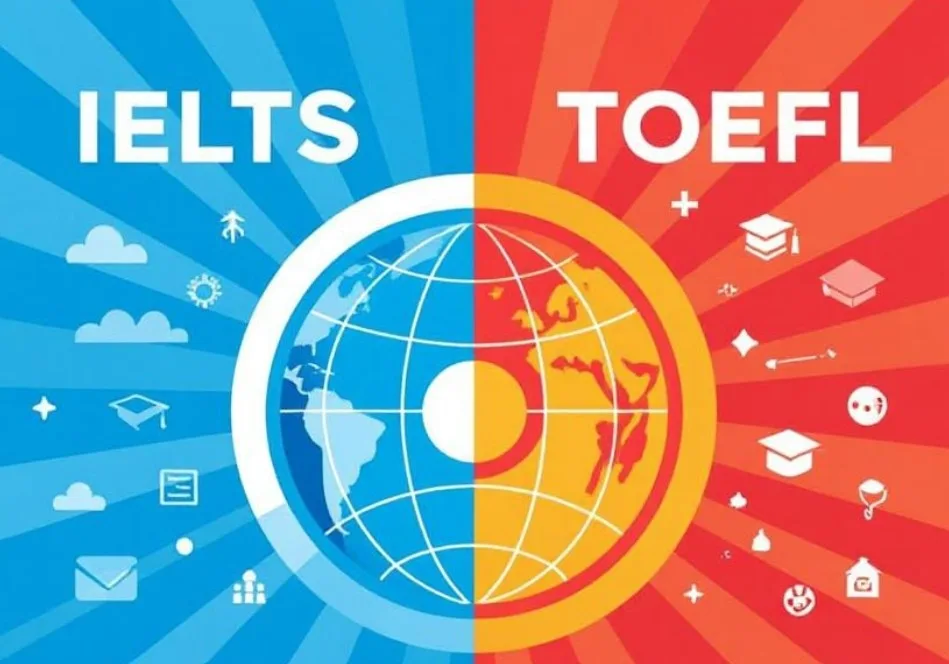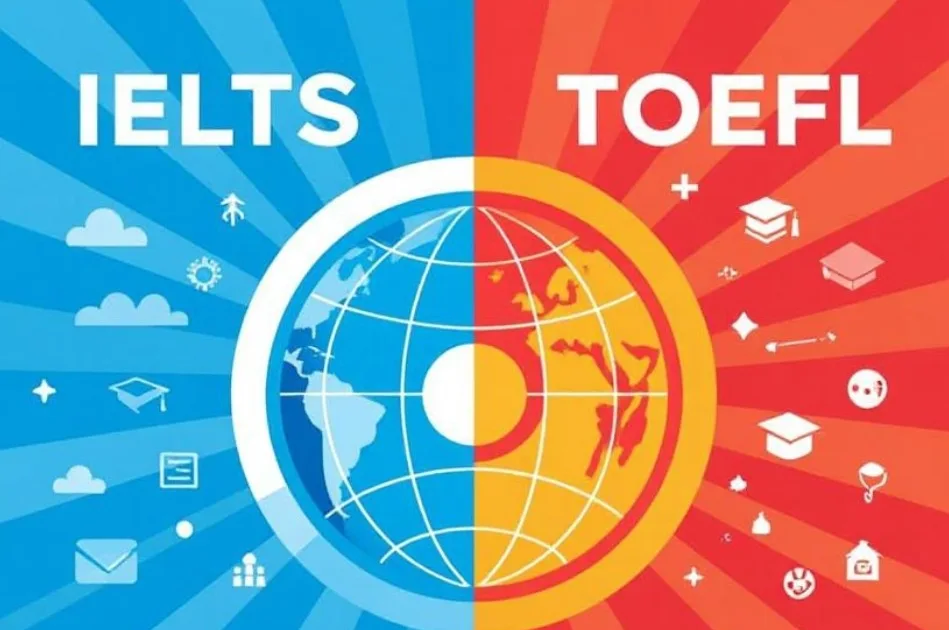When I first decided to study abroad three years ago, I found myself staring at two acronyms that would determine my future: IELTS and TOEFL. Like thousands of students worldwide, I was confused about which test would better serve my goals. After extensive research and speaking with education consultants, I discovered that choosing between these tests isn’t just about personal preference, it’s about understanding which one aligns with your specific objectives.
What is IELTS? Understanding the Basics
The International English Language Testing System (IELTS) has become the gold standard for English proficiency assessment globally. But what is IELTS exactly? Developed jointly by the British Council, IDP Education, and Cambridge Assessment English, IELTS evaluates your ability to communicate effectively in English across four key skills: listening, reading, writing, and speaking.
What sets IELTS apart is its practical approach to language testing. During my preparation phase, I noticed that IELTS questions mirror real-world scenarios you’d encounter while studying or working in English-speaking environments. The test comes in two versions: Academic (for university admissions) and General Training (for work and migration purposes).
TOEFL: The American Standard
The Test of English as a Foreign Language (TOEFL), administered by Educational Testing Service (ETS), has been around since 1964. Initially paper-based, TOEFL has evolved into a primarily internet-based test (TOEFL iBT) that’s particularly popular among students targeting American universities.
Unlike IELTS, TOEFL focuses heavily on academic English, making it ideal for those pursuing higher education. The test integrates multiple skills within single questions—for instance, you might listen to a lecture and then write about it, simulating actual classroom experiences.
Technical Differences: Format and Structure
IELTS Technical Specifications
The IELTS structure reflects its British origins while maintaining global relevance:
- Duration: 2 hours 45 minutes
- Scoring: Band scores from 1-9 (half bands allowed)
- Speaking: Face-to-face interview with examiner
- Writing: Two tasks requiring different writing styles
- Listening: 30 minutes plus 10 minutes transfer time
What struck me most about IELTS was the speaking component. Having a real conversation with an examiner felt more natural than speaking into a computer. Many test-takers I spoke with shared this sentiment, particularly those who perform better in interactive settings.
TOEFL Technical Framework
TOEFL’s internet-based format offers a different experience:
- Duration: 3 hours
- Scoring: 0-120 scale (30 points per section)
- Speaking: Computer-recorded responses
- Writing: Integrated and independent tasks
- Listening: Longer passages, mostly academic content
The integrated tasks in TOEFL particularly challenge test-takers. You’ll need to read, listen, and then respond—a skill that’s incredibly valuable for academic success but can be overwhelming during test preparation.
Global Popularity and Acceptance
IELTS Market Dominance
Recent statistics show IELTS leading globally with over 3.5 million test-takers annually. Its popularity stems from widespread acceptance across English-speaking countries. During my research, I discovered that IELTS is:
- Accepted by over 11,000 organizations worldwide
- Required by most UK universities
- Preferred for Canadian immigration (through Express Entry)
- Increasingly accepted by US institutions (over 3,400 colleges)
The availability of IELTS Online Exam options has further boosted its accessibility, especially post-pandemic. Many test centers now offer computer-delivered IELTS alongside traditional paper-based tests, giving candidates more flexibility.
TOEFL’s American Stronghold
While TOEFL’s global numbers are lower (around 2 million annually), it maintains strong positions in specific markets:
- Preferred by 90% of US universities
- Popular in East Asian countries (Japan, Korea, China)
- Strong presence in academic circles
- Growing acceptance in Europe and Australia
Educational Applications: University Admissions
IELTS in Higher Education
Universities worldwide recognize IELTS scores, but requirements vary significantly. British institutions typically require:
- Undergraduate programs: 6.0-6.5 overall
- Graduate programs: 6.5-7.5 overall
- Medical/Law programs: 7.0-8.0 overall
The IELTS Mock Test resources available online have become invaluable for preparation. These practice tests simulate actual exam conditions, helping students familiarize themselves with question formats and timing constraints.
TOEFL Academic Requirements
American universities generally expect:
- Undergraduate programs: 70-80 TOEFL iBT
- Graduate programs: 80-100 TOEFL iBT
- Competitive programs: 100+ TOEFL iBT
The integrated nature of TOEFL questions better prepares students for American academic culture, where combining multiple information sources is common.

Professional and Career Implications
IELTS in the Workplace
From my conversations with HR professionals, IELTS General Training holds significant value in professional contexts. It’s particularly relevant for:
- Healthcare professionals (nursing, medical licensing)
- Engineers seeking international opportunities
- Business professionals in multinational companies
- Service industry workers in English-speaking countries
The practical scenarios in IELTS writing tasks—like writing complaint letters or explaining processes—directly translate to workplace communication skills.
TOEFL Professional Applications
TOEFL’s academic focus sometimes limits its direct workplace applicability. However, it’s valuable for:
- Research positions requiring academic English
- Corporate roles involving technical documentation
- International business development
- Educational sector employment
Migration and Immigration Pathways
IELTS Immigration Advantages
Immigration authorities have shown clear preferences, with IELTS dominating most pathways:
Canada: Express Entry system requires IELTS General Training, with minimum CLB (Canadian Language Benchmark) levels varying by program. The recent changes to immigration policies have made English proficiency more critical, increasing IELTS demand.
Australia: Skilled migration programs accept both tests but IELTS remains more popular. The SkillSelect system awards points based on English proficiency, making higher IELTS scores financially beneficial.
United Kingdom: Post-Brexit immigration policies heavily favor IELTS for work visas and settlement applications.
TOEFL Migration Limitations
TOEFL faces restrictions in immigration contexts:
- Not accepted for Canadian Express Entry
- Limited recognition in Australian migration programs
- Rarely used for work visa applications
This limitation significantly impacts TOEFL’s appeal for individuals with long-term settlement goals.
Future Trends and Predictions
Digital Transformation Impact
The shift toward digital testing has affected both exams differently. IELTS Online Exam adoption accelerated during COVID-19, with many test-takers appreciating the home-testing convenience. However, the speaking component remains face-to-face, preserving IELTS’s interactive advantage.
TOEFL’s existing digital infrastructure provided seamless transitions during pandemic restrictions, but this advantage may diminish as IELTS expands its online offerings.
Emerging Market Dynamics
Several trends are reshaping the testing landscape:
- AI Integration: Both organizations are exploring AI-assisted scoring, potentially improving consistency and reducing waiting times.
- Micro-credentials: Shorter, skill-specific assessments may supplement comprehensive tests for specific professional needs.
- Mobile Testing: Smartphone-based assessments could revolutionize accessibility, particularly in developing markets.
Regional Preference Shifts
Immigration policy changes continue influencing test choice. Canada’s Express Entry system modifications and Australia’s updated skilled occupation lists directly impact IELTS demand. Meanwhile, increasing US university acceptance of IELTS suggests a gradual market convergence.
Making Your Decision: Practical Considerations
Choose IELTS If You:
- Plan to study in the UK, Australia, or Canada
- Need immigration qualification for English-speaking countries
- Prefer face-to-face speaking assessments
- Want flexibility between Academic and General Training versions
- Value extensive IELTS Mock Test resources for preparation
Choose TOEFL If You:
- Target American universities exclusively
- Excel at integrated academic tasks
- Prefer computer-based testing environments
- Have strong listening skills for academic content
- Don’t require the test for immigration purposes
Preparation Strategies for Success
IELTS Preparation Approach
Successful IELTS preparation involves:
- Regular IELTS Mock Test practice to familiarize yourself with timing and format
- Accent exposure through British, Australian, and international English media
- Writing task variety covering both academic and general formats
- Speaking practice with native speakers or conversation partners
TOEFL Preparation Focus
Effective TOEFL preparation emphasizes:
- Academic vocabulary building through scholarly articles and lectures
- Note-taking skills for integrated tasks
- Computer-based practice to build typing speed and comfort
- Listening stamina development for longer academic passages
Cost and Accessibility Considerations
Both tests carry similar costs ($200-250 USD globally), but availability differs by region. IELTS generally offers more test dates and locations worldwide, while TOEFL may have limited availability in certain countries.
The introduction of IELTS Online Exam has improved accessibility, particularly for test-takers in remote areas or those facing mobility challenges.
Conclusion: Your Path Forward
Choosing between IELTS and TOEFL isn’t about finding the “easier” test—both rigorously assess English proficiency. Instead, your decision should align with your specific goals, target institutions, and future plans.
For most international students and professionals, IELTS offers greater versatility, especially if immigration is a consideration. Its acceptance across education, employment, and immigration pathways makes it a comprehensive choice.
However, if you’re focused solely on American higher education and excel at integrated academic tasks, TOEFL might better serve your needs.
Remember, regardless of which test you choose, success depends on thorough preparation, regular practice, and understanding the test format. Whether you’re taking IELTS Mock Tests or TOEFL practice exams, consistent preparation will lead to the scores you need to achieve your international goals.
The English proficiency test you choose today shapes your tomorrow’s opportunities. Make an informed decision based on your unique circumstances, and commit fully to your preparation journey. Your future self will thank you for the effort you invest now.




